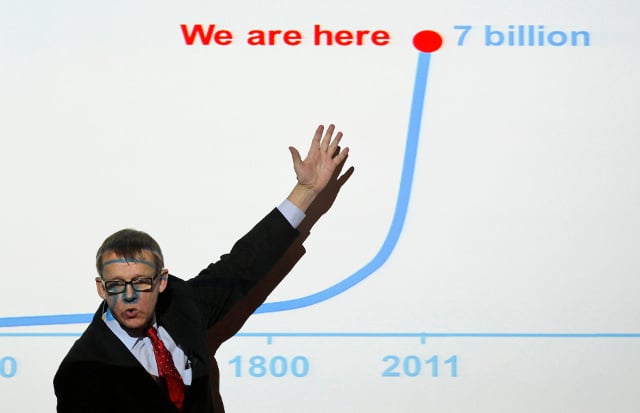Many who have had to use statistics, or even worse, to sit through hours of lectures on statistical theory from a boring speaker, regard them as a necessary evil. Numbers aren’t often terribly exciting, and it can be hard to decipher their meaning. But statistician Hans Rosling, who has died aged 68, somehow managed to be both hugely entertaining and passionate about data.
Rosling was a professor of international health at Sweden’s Karolinska Institute, but the talented presenter and sword swallower also regarded himself as an “edutainer”. He could make statistical data interesting and entertaining like no other – his animations and alternative methods of visualising data have featured in numerous films, TED Talks and on YouTube.
I became aware of his presentations around ten years ago, when I was desperately trying to find new and exciting ways to communicate statistics. When I first watched his videos, I was entirely taken aback by his ability to do this with both wit and clarity. He had an incredible ability to inject humour into statistics and used objects such as toys, cardboard boxes and teacups to liven up disease inequality and population growth data.
Although it was entirely unexpected for an epidemiologist/statistician, he was so effective in communicating ideas that Time magazine included him in its 2012 list of the world’s 100 most influential people. They said that his “stunning renderings of the numbers … have moved millions of people worldwide to see themselves and our planet in new ways”.
In fact, after watching one of his lectures on global health, Bill Gates decided to donate billions of dollars to the issue. He described Rosling as “a global health hero” and Melinda Gates said that that learning from him was “one of the biggest honours in the world”.
Rosling’s original research had a particular focus on the links between economic development, agriculture, poverty and health. He spent many years investigating outbreaks of the neurological disorder, konzo, in remote rural areas across Africa. His work with a number of collaborators and colleagues, found that outbreaks occurred among the hunger-stricken rural populations, where diets were dominated by insufficiently processed cassava which led to malnutrition and high cyanide intake.
Despite being extremely popular, his showmanship and excessive optimism in relation to population growth were certain to attract some criticism. Rosling said that “fast population growth is coming to an end” which may have been true globally, but noted biologists Anne and Paul Ehrlich said that this ignored the fact that in Nigeria, Zambia and The Yemen this was not the case.
They described him as a confused statistician, a “Pollyannaish” figure who wanted to put a positive spin on all situations despite continuing population growth and environmental degradation in many countries. They said that Rosling’s claim that “the ‘developed’ and ‘developing’ worlds have gone” was not true, and that almost half of humanity live in conditions that the average American, Australian, European, or Japanese would find unacceptable, while two billion are seriously underfed or malnourished.
This view was not held by all however, and many such as noted psychologist Steven Pinker continued to admire his work – describing it as “a stroke of genius”.
Stats to tackle social issues
Rosling remained popular and one of his most famous statements remains: “My interest is not data, it’s the world, and part of world development you can see in numbers.” After his work in Africa, he described data as the most effective way to understand and overcome global development issues – a way to tackle the huge and devastating ignorance that drove many of the world’s health, social and economic problems.
Rosling was highly motivated and focused on developing data communication methods which promoted sustainable global development and aimed to help achieve the United Nations Sustainable Development Goals. He even set up the Gapminder Foundation in 2006, with his son and daughter-in-law, which “fights devastating misconceptions about global development” by presentation of the facts.
As a young man, Rosling unfortunately discovered a problem with his liver, and later contracted hepatitis C which developed further into liver cirrhosis. Given his detailed knowledge of epidemiology, he would have been very aware of his increased risk of developing one of the most malignant of diseases – pancreatic cancer. And to the sadness of the world, this is what took him at the relatively early age of 68.
He once said, “I became so famous with so little impact on knowledge. Fame is easy to acquire, impact is much more difficult” – but on this point, I have to disagree with him. Rosling had a huge impact on the world of statistics and their communication, and his loss is even more keenly felt at a time when fake news, alternative facts and misinformation is rife. He stood for the idea that both facts and an open mind are needed before informed discussions can begin, and he will surely be missed.
Keith Morris, Professor of Biomedical Sciences and Biostatistics, Cardiff Metropolitan University
This article was originally published on The Conversation. Read the original article.




 Please whitelist us to continue reading.
Please whitelist us to continue reading.